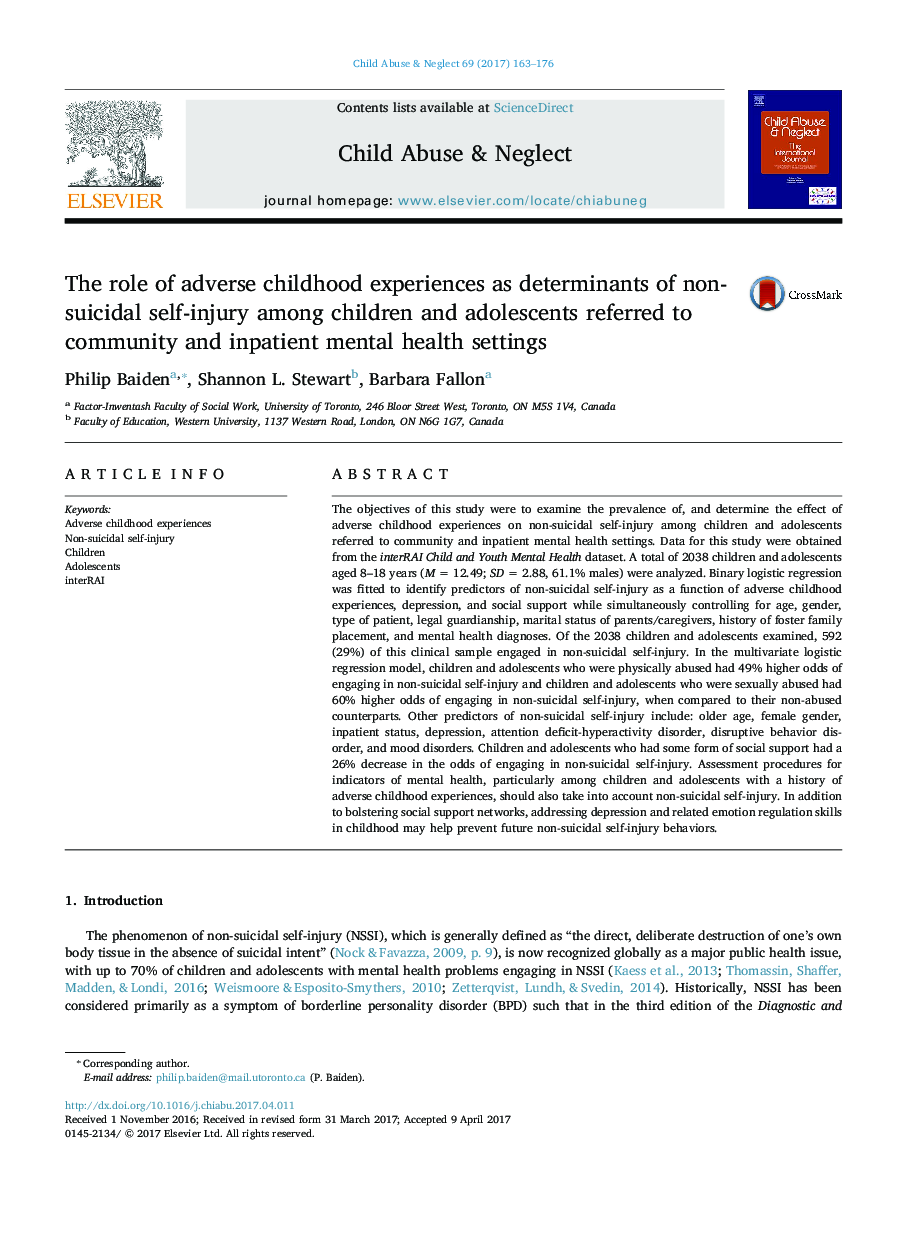| کد مقاله | کد نشریه | سال انتشار | مقاله انگلیسی | نسخه تمام متن |
|---|---|---|---|---|
| 4935994 | 1434359 | 2017 | 14 صفحه PDF | دانلود رایگان |
عنوان انگلیسی مقاله ISI
The role of adverse childhood experiences as determinants of non-suicidal self-injury among children and adolescents referred to community and inpatient mental health settings
ترجمه فارسی عنوان
نقش تجربیات دوران کودکی بعنوان عوامل تعیین کننده خودمختاری ناشی از خودکشی در کودکان و نوجوانانی که به تنظیمات سلامت روانی جامعه و بستری مراجعه می کنند
دانلود مقاله + سفارش ترجمه
دانلود مقاله ISI انگلیسی
رایگان برای ایرانیان
کلمات کلیدی
موضوعات مرتبط
علوم پزشکی و سلامت
پزشکی و دندانپزشکی
پریناتولوژی (پزشکی مادر و جنین)، طب اطفال و بهداشت کودک
چکیده انگلیسی
The objectives of this study were to examine the prevalence of, and determine the effect of adverse childhood experiences on non-suicidal self-injury among children and adolescents referred to community and inpatient mental health settings. Data for this study were obtained from the interRAI Child and Youth Mental Health dataset. A total of 2038 children and adolescents aged 8-18 years (MÂ =Â 12.49; SDÂ =Â 2.88, 61.1% males) were analyzed. Binary logistic regression was fitted to identify predictors of non-suicidal self-injury as a function of adverse childhood experiences, depression, and social support while simultaneously controlling for age, gender, type of patient, legal guardianship, marital status of parents/caregivers, history of foster family placement, and mental health diagnoses. Of the 2038 children and adolescents examined, 592 (29%) of this clinical sample engaged in non-suicidal self-injury. In the multivariate logistic regression model, children and adolescents who were physically abused had 49% higher odds of engaging in non-suicidal self-injury and children and adolescents who were sexually abused had 60% higher odds of engaging in non-suicidal self-injury, when compared to their non-abused counterparts. Other predictors of non-suicidal self-injury include: older age, female gender, inpatient status, depression, attention deficit-hyperactivity disorder, disruptive behavior disorder, and mood disorders. Children and adolescents who had some form of social support had a 26% decrease in the odds of engaging in non-suicidal self-injury. Assessment procedures for indicators of mental health, particularly among children and adolescents with a history of adverse childhood experiences, should also take into account non-suicidal self-injury. In addition to bolstering social support networks, addressing depression and related emotion regulation skills in childhood may help prevent future non-suicidal self-injury behaviors.
ناشر
Database: Elsevier - ScienceDirect (ساینس دایرکت)
Journal: Child Abuse & Neglect - Volume 69, July 2017, Pages 163-176
Journal: Child Abuse & Neglect - Volume 69, July 2017, Pages 163-176
نویسندگان
Philip Baiden, Shannon L. Stewart, Barbara Fallon,
